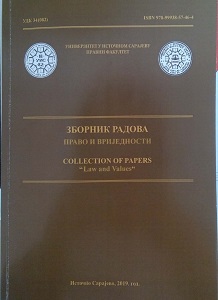A Few Reflections about Practice of States Regarding Succession to Multilateral Treaties
A Few Reflections about Practice of States Regarding Succession to Multilateral Treaties
Author(s): Milenko Kreća
Subject(s): Law, Constitution, Jurisprudence, Politics and law
Published by: Правни факултет Универзитета у Источном Сарајеву
Keywords: Multilateral treaties; Succession; State practice; Jus cogens; Vienna Convention on Succession of States in respect to treaties
Summary/Abstract: The author discusses the practice of successor States in respect of multilateral treaties in the frame of dichotomy ipso iure /consented succession. He comes to the conclusion that the practice favours consented succession to multilateral treaties. Such practice seems reasonable for a number of reasons. First of all, if we stick to the difference between the predecessor State and the successor State in terms of legal personality, it is unclear how the successor State, a new State, may be considered bound by the will of the predecessor State, being another State in legal terms. Such an understanding obliterates the difference between the predecessor State and the successor State as distinct legal personalities and relies on the fiction that, in respect of treaties, their wills consur. Further, a rule on automatic succession runs counter to the fundamental principle of equality of States to the detriment of successor States. Successor States, by applying this rule, would be deprived of the rights which, otherwise, States have when expressing consent to be bound, such as, for example, making a reservation in respect of part of a treaty or accepting to be bound by a treaty under certain conditions. Finally, automatic succession rests on, or is substantially close to, the idea of universal succession in civil law which is incompatible with an essentially consensual order, in which the main legal persons are States as equal and sovereign political entities. Substantive provisions of general international treaties adopted in the interests of the international community as a whole being part of corpus iurus cogentis, have a special position. These provisions are ab initio et suo vigore binding on any successor State regardless of the law of succession in respect of treaties.
- Page Range: 1-11
- Page Count: 11
- Publication Year: 2019
- Language: Serbian
- Content File-PDF

